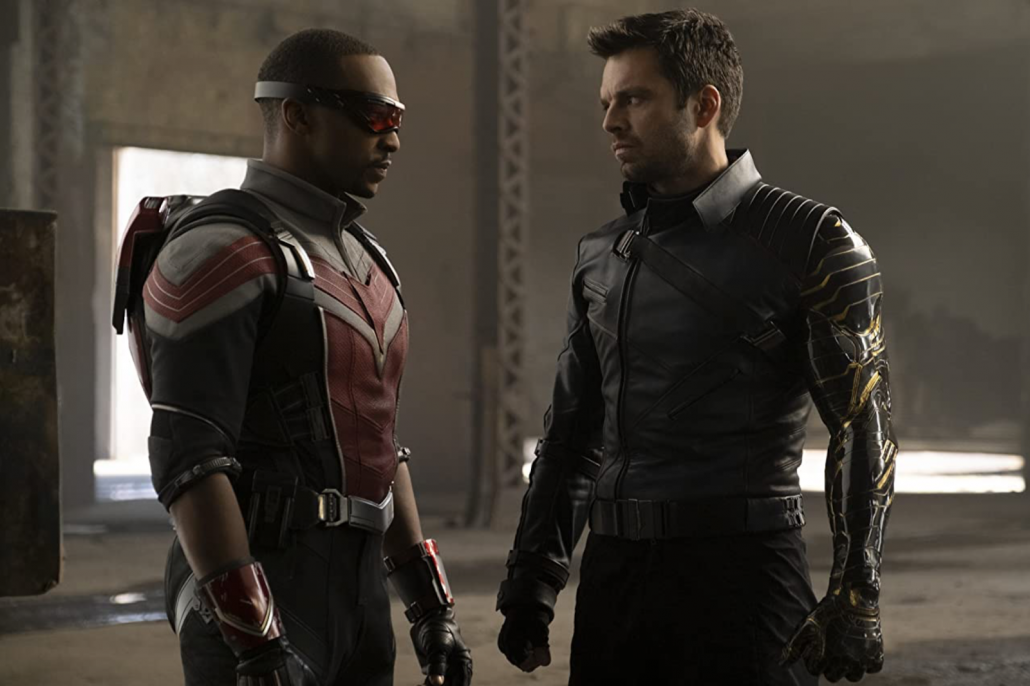REVIEW: Marvel’s ‘Falcon and the Winter Soldier’ fails to live up to its hype

Marvel fanatics have, for years, been begging for more screen time for Captain America’s beloved sidekicks Falcon and the Winter Soldier. The pair’s witty banter and sheer hilarity enamored fans, but their continual lack of dialogue and attention constantly disappointed Marvel supporters.
Marvel’s latest Disney+ show, “Falcon and the Winter Soldier,” attempts to appease its fans by giving the people what they want: more of Falcon (Anthony Mackie) and the Winter Soldier (Sebastian Stan).
The premise of the show is cute: two beloved action heroes coming together to save the world. In previous Marvel movies, the pair took on a fun buddy-cop vibe where they cracked jokes and had a playful rivalry, but came together when the moment mattered.
However, the first episode of the highly anticipated Marvel production shows the two friends living completely separate lives.
Audiences meet Falcon first — mid-mission and taking on an army of bad guys by himself. This introduction does its best to paint Falcon as a strong Avenger. Basically, it seems as though Marvel realized they had to make Falcon cooler and more powerful to open up a wider range of possible plotlines, and this scene is its way of establishing that. The unnecessary extravagance of the opening introduction is also reminiscent of typical Marvel fight scenes, immediately establishing “Falcon and the Winter Soldier” as a stereotypical Marvel production.
The show also establishes a much-needed backstory for Falcon; the viewer learns that Falcon is a man who abandoned his family to join the armed forces but is now attempting to save his family’s fishing boat business from going under. Falcon’s backstory dives into the real-life consequences of the snap, showing how family relationships, particularly his own, were affected by the blip. His scenes are serious, and a departure from the comedic and sarcastic Falcon audiences are used to seeing. Albeit necessary to get audiences to connect with their new leading man, his backstory is shockingly normal and boring in comparison to that of other Marvel characters.
These scenes are an obvious attempt at showcasing Falcon’s guilt for being “snapped away” by Thanos, and the poor writing makes some parts corny and cliche. Frankly, Falcon deserves better than this.
After a drawn-out introduction to Falcon, the show immediately reintroduces the audience to the Winter Soldier. Unlike Falcon, the Winter Soldier does not need an introduction to establish his strength, as people can watch the Captain America movies to learn about that. Instead, audiences meet a free Bucky Barnes, no longer under Hydra’s control, attempting to assimilate in the United States while coping with grief and post-traumatic stress disorder.
“Falcon and the Winter Soldier” tries to establish Barnes as a grief-stricken and solemn war veteran who tries to cope with over 70 years of guilt and trauma by befriending an elderly Japanese man and attending therapy. Although introduced as a serious character in “Captain America and the Winter Soldier,” Barnes’ recent arc has turned him into a funny superhero. “Falcon and the Winter Soldier” attempts to restore a somber version of this character.
Winter Soldier’s reintroduction as a serious character is subpar at best: His serious scenes include weird close-ups on Stan’s face and odd camera angles meant to make conversations more emotional. However, these stylistic choices take serious subject matters and make them almost laughable because, frankly, it is funny to be staring at the character’s cheek for two minutes.
In attempting to make Falcon and the Winter Soldier serious characters, the show shoots itself in the foot. Mackie and Stan are charming and charismatic actors, and that is what audiences know and love them as. Attempting to rewrite them as serious, angsty superheroes diminishes their likability.
Although a show exploring our leads’ mental health could be insightful, it is not done well enough in “Falcon and the Winter Soldier” to seriously add any meaning. These emotions deserve more than a quick therapy visit or a flashback in a dream, and relegating them to subplots diminishes their emotional pull. After watching a show such as “WandaVision,” it is hard to see a Marvel character’s grief treated as a secondary plot, knowing how well Marvel can explore it if it wanted to.
However, although the premiere episode faltered, there is still hope for this show. For one, the episode teases an intriguing villain that appears to be “an Avengers level threat.” For an opening episode that moves surprisingly slowly, it ends with a shocking plot twist that opens the door for a multitude of storylines.
More importantly, glimpses of the funny and charismatic Falcon are sprinkled amongst his more serious scenes and moments of dry humor from the Winter Soldier remind audiences why we love these characters.
Although the show is flawed, it’s necessary to keep in mind what it is meant for: pure fan service, done by Marvel, to appease its large legion of adoring supporters. It does that by giving fan-favorite heroes more screen time. The show is fun, and seeing these characters on our screens again is a bittersweet nostalgic throwback to pre-coronavirus times.
Despite all its initial problems, “Falcon and the Winter Soldier” has potential and deserves time to find itself.
Rating: 3/5 stars

